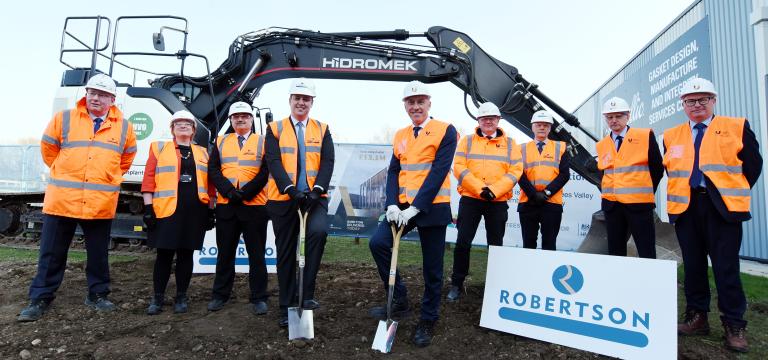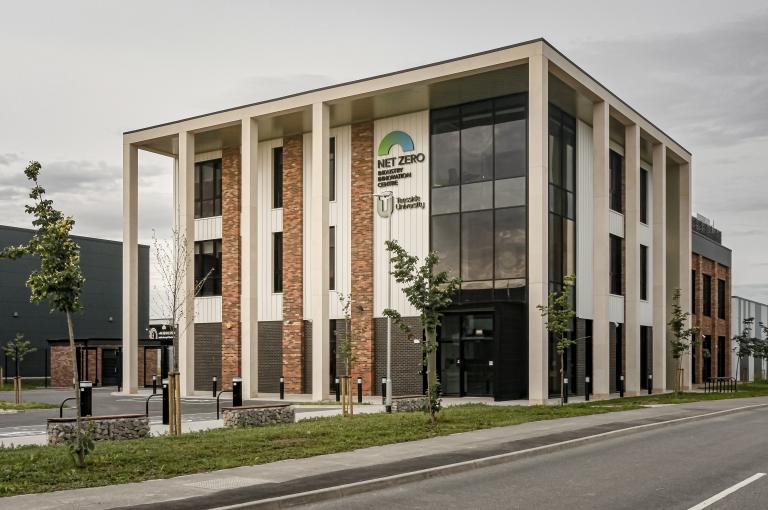
22 March 2022
Construction of new Teesside University Net Zero Industry Innovation Centre underway
Construction of new Teesside University Net Zero Industry Innovation Centre underway
Partners in an ambitious new development which positions Teesside firmly at the heart of the green industrial revolution came together this week to mark the beginning of the build and highlight the importance the project will have on the region and beyond.
Located at the expanding Tees Valley Net Zero Innovation Hub, the £13.1m Net Zero Industry Innovation Centre (NZIIC) will support the drive for clean energy. The project has received £5.2 million in funding from the Tees Valley Mayor and Combined Authority and the European Regional Development Fund.
The NZIIC will play a vital role in the delivery of Net Zero ambitions for the region and the UK. A hub for industrial decarbonisation and a national centre of excellence for net zero technologies, it positions Teesside firmly at the heart of the UK's green industrial revolution, providing a focus for major investment.
The NZIIC will grow net zero capabilities and opportunities, creating hundreds more clean energy jobs and strengthening the existing innovation ecosystem through provision of specialist facilities and support.
Main contractor Robertson has prioritised the use of innovative materials, techniques and equipment to ensure the build itself maintains the net zero ethos of the project.
The NZIIC is the latest project in Teesside University's Campus Masterplan, which has already seen £275m invested to date, with continued development and investment through to 2027.
Professor Steve Cummings, Pro Vice-Chancellor (Research and Innovation) at Teesside University said: "Forging a smarter and greener industrial economy is a key focus of the research undertaken by Teesside University. The Net Zero Industry Innovation Centre is integral to the delivery of this activity.
"Aligning the expertise of the University with industry need and government priorities, the NZIIC will deliver clear impact across collaborative research and development, enhanced productivity, environmental and business sustainability. It marks a unique opportunity to grow capabilities across clean energy and the circular economy."
Professor Paul Croney OBE, Vice-Chancellor and Chief Executive of Teesside University, added: "Teesside University is committed to becoming a Net Zero institution by 2030 and this latest development is a testament to those ambitions.
"Working with our partners, this development will support our work, not only in sustainability, but in driving change through skills development, research and innovation."
Tees Valley Mayor Ben Houchen said: "This is yet another fantastic project seeing spades in the ground and shows our year of construction is not restricted to Teesworks or our airport – steel is going up across Teesside, Darlington and Hartlepool.
"These cleaner, safer and healthier industries are central to our ambitions as the UK's low-carbon powerhouse and are creating the good-quality, well paid jobs for local workers. Teesside University's centre for excellence will help drive this forward, working with our brilliant businesses to boost innovation, push boundaries and further put our region on the map."
Garry Hope, regional managing director, Robertson Construction North East, said: "Robertson is committed to being socially, economically and environmentally responsible. Our values, which align with those of the University, will be embedded throughout the entire build programme.
"As the contractor of choice for the facility, we will be playing a significant role in assisting the University in further enhancing its contribution to the local economy and communities through creating opportunities for both where possible. We will also be working with the University to minimise the environmental impact of the build phase."
With an estimated completion of Spring next year, the NZIIC will focus on four core areas:
- Hydrogen and Decarbonisation: adapting hydrogen applications, optimising industrial processes and developing alternatives to current chemicals and overcoming the challenges of hydrogen storage and carbon capture.
- Circular Economy: investigating applications of thermal and chemical processing and recycling to optimise, reduce costs and bring new technology to market.
- Intelligent Energy and Industrial Systems: supporting product and service innovation to drive forward the smart energy and smart grid agenda.
- Digital Modelling and Simulation: providing support for maintenance and operation of industrial assets, including virtual and artificial reality and remote operations.

